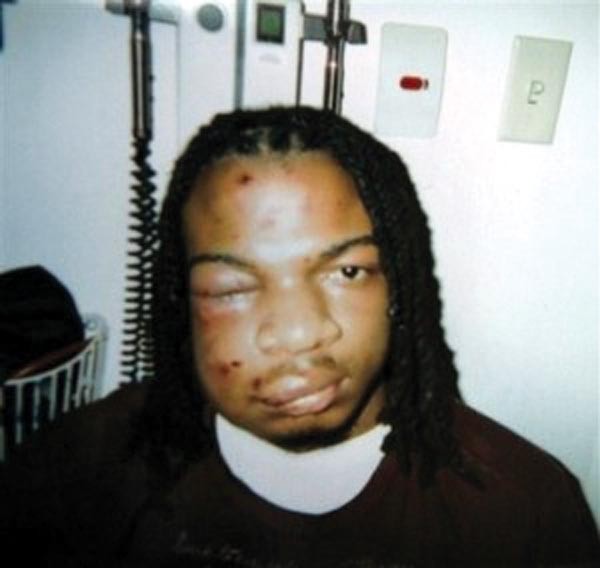Jordan Miles' eye is not swollen shut, this time. There is no knot on his head. His hair hasn't been ripped out. But after watching the three-week-long trial in his civil-rights lawsuit against three Pittsburgh police officers, it's hard not to feel like he's been battered all over again.
The first time took place when he ran afoul of three police on a cold night in January 2010, and it was his body and mind that suffered. (Miles has been diagnosed with a brain injury and post-traumatic stress disorder.) This time, though, it was Miles' reputation that bore the brunt, at the hands of three attorneys.
"He's a fine young man of average intelligence," oozed Bob Leight, attorney for officer Richard Ewing in his closing argument. "If nothing else, he has a great future at CVS [pharmacy, where Miles currently works] and there's nothing wrong with that."
"They say he's an honor student. ... He's an honor student at CAPA," condescended Bryan Campbell, attorney for officer Michael Saldutte.
"Jordan Miles was ripped. You saw the MySpace page," thundered Jim Wymard, attorney for officer David Sisak, about photos of a shirtless, flexing Miles, taken and posted online when he was between 14 and 16 years old. "He called himself Bulky J. He wanted to be bulky!"
Miles accused those three officers of assailing him for no good reason — and without identifying themselves — while he was walking to his grandmother's house to sleep. Police claimed he was acting furtively, and tried to flee when they hailed him. They worried a suspicious bulge in his jacket concealed a gun, though it was nothing more than a bottle of pop. (And maybe not even that; police never produced the bottle and Miles says he never had one. )
On the stand, Miles was quiet, sometimes looking at the jury, sometimes toward the floor. But while he was the plaintiff, it often seemed like he was the one on trial. To the extent that a 20-year-old can have a past, that of Jordan Miles was paraded before a jury.
Defense attorneys detailed how Miles' girlfriend left him for his best friend. They called attention to a fight he'd been involved in ... when he was in eighth grade. Nearly a dozen times, they mentioned how he'd ranked 85th in his class of 119. While Miles was an honor student in his junior and senior year, he'd struggled early on: Attorneys mocked his 2.8 cumulative GPA, his 1080 SAT score.
And all of this was at CAPA, the attorneys sneered. While the city's Downtown arts school is among its most prestigious, defense attorneys made it sound like the equivalent of bird-grooming school. It was a characterization the school's principal, Melissa Pearlman, took aim at — "in 2009 we were named by the state as Blue Ribbon School," she said of the honor bestowed on schools that are "academically superior" — while defending Miles' academic record.
By contrast, jurors heard little about the defendants. Sisak mentioned being a father. Jurors learned Ewing is a Marine veteran with combat experience, and that Saldutte teaches martial arts. In closing arguments, Wymard lauded the officers as "heroes doing the work that no one else wants." But surprisingly little was said about their work history.
It wasn't for lack of trying. Miles attorney J. Kerrington Lewis tried to ask Police Chief Nate Harper if he ever looked at the officers' personnel records. But a defense objection was upheld and he never answered.
And as the chief testified in the courtroom, a potentially crucial witness stood in the waiting area. Pittsburgh Police Commander Rashall Brackney was prepared to testify about the officers' pasts ... presumably about something more troubling than a "C" in history.
According to court documents, Brackney gave a deposition in which she claimed the trio "had a history of lying and taking action" even if a suspect's behavior had "not ris[en] to [the] level of reasonable suspicion." Brackney had apparently ordered that Sisak and Ewing "be closely monitored and supervised." Such claims might have thrown light on the Miles case, in which the officers are accused of chasing down Miles for no good reason, and inventing a justification for it afterward.
But Brackney's testimony, though summarized by a report compiled for the plaintiffs by a police expert, has not been released. Jurors never heard it for themselves, and we may never find out if her allegations had merit. Before the trial began, federal judge Gary Lancaster had ruled that she could only testify in rebuttal —if, for example, a witness claimed the three officers had never been reprimanded. The jury never heard her concerns
Courts worry that bringing up someone's past history can have, as the officers' attorneys contended, "a prejudicial effect."
"[Brackney's testimony] will cause the jury to conclude that because defendants have engaged in misconduct in the past, they are likely to have done so in this case," attorneys for the officers wrote.
Jordan Miles received no such considerations. He took all they could throw at him. Just like he did the night, as Lewis explained, the officers "thought he was a black, drug-dealing punk and they were going to take him down."
Over the course of the past three weeks, Jordan Miles was taken down again. These bruises, however, are going to take even longer to heal.



















